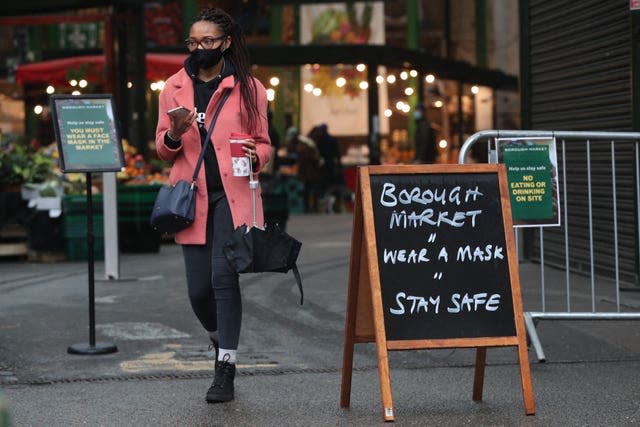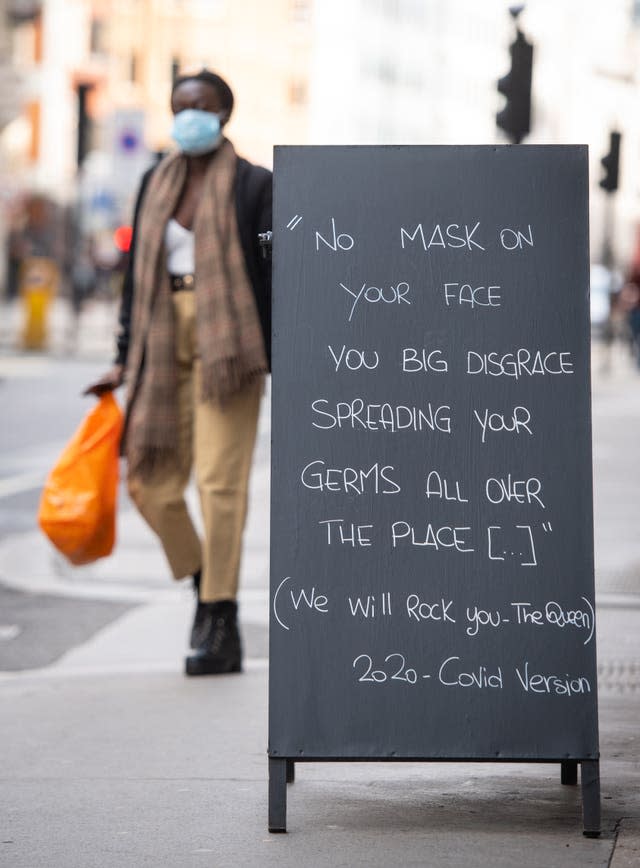Expert among those who will continue wearing face masks if measure is scrapped
An expert advising the Government’s coronavirus response has said he will continue to wear a face mask “indefinitely” despite reports that there are plans to scrap the measure.
Boris Johnson is understood to be preparing to update the nation this week on his plans for “freedom day” unlocking on July 19, with multiple newspapers suggesting that he believes a host of domestic measures can end on his “terminus date”.
Professor Adam Finn, from the Government’s Joint Committee on Vaccination and Immunisation (JCVI), said mask wearing is extremely valuable under certain circumstances and he does not plan to ditch his masks this month.

He told Sky News’ Trevor Phillips On Sunday programme: “Well on a personal level I shall certainly be continuing to wear a mask if I’ve got any symptoms or if I’m in an enclosed space with lots of other people for a prolonged period of time, indefinitely in fact.”
Prof Finn explained: “I think we learned, as paediatricians, we learned that we can avoid massive problems with children getting sick in the winter by doing these kind of measures.
“We simply didn’t see the epidemics of respiratory viruses last winter that we’ve seen every year throughout my career.
“So I actually now completely understand it, whereas I was puzzled before when I saw Asian people on the Tube wearing masks in the pre-pandemic era.
“So I think mask wearing is obviously something we’ve learned is extremely valuable to do under certain circumstances. That doesn’t mean I’ll wear a mask all the time but it does mean I will some of the time.”

Pressed on whether he would “get rid” of his mask after July 19 if permitted to do so, Cabinet minister Robert Jenrick said on the same programme: “I will. I don’t particularly want to wear a mask. I don’t think a lot of people enjoy doing it.”
Professor Stephen Powis, national medical director of NHS England, said he believed people would naturally be more cautious and may continue to wear face masks out of choice.
He told Andrew Marr on BBC One: “I think some people will choose to be more cautious. Some people may choose to wear face masks in particular circumstances, such as crowded environments, and that’s not necessarily a bad thing. Those habits to reduce infections are a good thing to keep.”
Dr Ellie Cannon also said she believes people may continue to wear face masks, telling BBC Breakfast: “It’s a very easy win for us to be wearing face masks, not all the time and not necessarily in the classroom.
“But I think particularly popping on a face mask if you are going into hospital to visit a relative, coming to my GP surgery, getting on a bus, I think that’s an easy win.
“And I actually think there will be many people who will continue to wear face masks, myself included, even after July 19 if the mandate is lifted.
“I’ve heard a lot of people say to me, who travel on the bus or the London Underground particularly in the winter, that they would absolutely put on a face mask, particularly in the winter because we all get used to having these coughs and colds and flu and if you can do something very simple to prevent that, why wouldn’t you?”
Dr Mike Tildesley, a member of the Scientific Pandemic Influenza Group on Modelling, which provides modelling evidence to the Scientific Advisory Group for Emergencies (Sage), said July 19 is “probably the right time” to consider ending the measure.
He told BBC Breakfast: “It’s an interesting one. If we are going to do that I think probably this is the right time to consider that.
“We know that of course masks have helped throughout the pandemic in terms of reducing the risk a little bit, but they’re part of a number of measures that do help to reduce the risk.”
He said he has been worried about some commentators suggesting masks might be around for a long time, as he pointed out they can be difficult for people who are hard of hearing and those who struggle with their mental health.
“I think probably if we are going to remove them, 19th of July when we are seeing really low numbers of hospital admissions and low number of deaths, is probably the right time to consider it,” he said.


